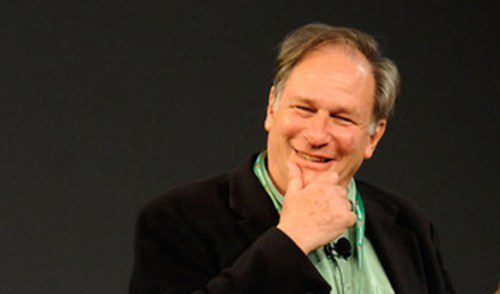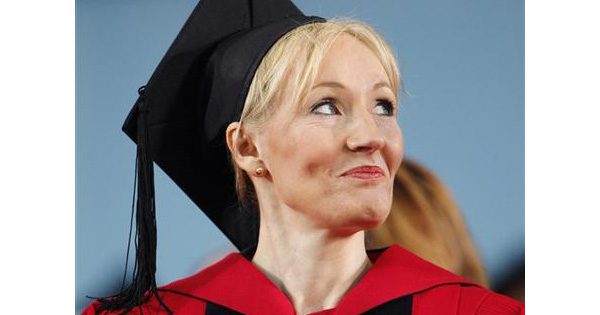It’s graduation season, so commencement addresses by actors, politicians, writers, musicians and other luminaries are sweeping the world of higher education across the entire spectrum of mediocrity and profound wisdom. Let’s use this as an invitation to remember some of the most compelling, provocative and deeply inspirational speeches of years past. Here are five of my all-time favorites.
 J. K. ROWLING AT HARVARD (2008)
J. K. ROWLING AT HARVARD (2008)
On June 5, 2008, Harry Potter author J. K. Rowling speaks about the benefits of failure and the crucial importance of imagination — in a way that isn’t the least bit contrived but is, rather, brimming with wit, wisdom, humor and humility.
I cannot criticize my parents for hoping that I would never experience poverty. They had been poor themselves, and I have since been poor. And I quite agree with them that it is not an ennobling experience. Poverty entails fear, and stress, and sometimes depression. It means a thousand petty humiliations and hardships. Climbing out of poverty by your own efforts, that is something on which to pride yourself. But poverty itself is romanticized only by fools.” ~ J.K. Rowling
Ultimately, we all have to decide for ourselves what constitutes failure. But the world is quite eager to give you a set of criteria if you let it. [F]ailure means a stripping away of the inessential. I stopped pretending to myself to be anything other than what I was, and began to direct all my energy into finishing the only work that mattered to me. Had I really succeeded at anything else, I might never have found the determination to succeed in the one arena where I believe I truly belonged. [R]ock bottom became the solid foundation on which I built my life.
 STEVE JOBS AT STANFORD (2005)
STEVE JOBS AT STANFORD (2005)
On June 12, 2005, Steve Jobs delivered Stanford’s 114th’s commencement address and spoke with remarkable candor and eloquence about connecting dots, education, love and loss. (And, yes, he manages to swiftly slip a Microsoft jab right in the middle of it.) The part that resonates with me the most is the heartfelt case he makes for following our creative curiosity, rather than formal education’s prescriptive paradigm of learning, in order to contribute to the world our best potential.
If I had never dropped out, I would have never dropped in on this calligraphy class, and personal computers might not have the wonderful typography that they do. Of course it was impossible to connect the dots looking forward when I was in college. But it was very, very clear looking backwards ten years later. Again, you can’t connect the dots looking forward; you can only connect them looking backwards. So you have to trust that the dots will somehow connect in your future. You have to trust in something — your gut, destiny, life, karma, whatever. This approach has never let me down, and it has made all the difference in my life.
Full transcript here.
 ROBERT KRULWICH AT BERKELEY (2011)
ROBERT KRULWICH AT BERKELEY (2011)
Robert Krulwich, co-producer of WNYC’s fantastic Radiolab, author of the ever-illuminating Krulwich Wonders and winner of a Peabody Award for broadcast excellence, is one of the best science writers working today. Last week, he addressed the graduating class at Berkeley’s School of Journalism and made some remarkably poignant points about passion and the future of journalism. No audio or video recording is available (yet), but you can read the full transcript here — and I can’t recommend enough that you do.

In every career, your job is to make and tell stories, of course. You will build a body of work, but you will also build a body of affection, with the people you’ve helped who’ve helped you back. This is the era of Friends in Low Places. The ones you meet now, who will notice you, challenge you, work with you, and watch your back. Maybe they will be your strength.
UPDATE: The video is now available, as is audio from Berkeley. Ingest and absorb:
 MERYL STREEP AT BARNARD (2010)
MERYL STREEP AT BARNARD (2010)
Meryl Streep may be best known as a 16-time Academy Award nominee and two-time winner, but in her fantastic 2010 commencement speech at Barnard College, Columbia University’s women’s-only sister institution, she reveals herself as equal parts political theorist, humorist and modern philosopher, speaking on issues of identity, gender roles, change and happiness.
Today is about looking forward, into a world where so called ‘women’s issues’ — human issues — of gender inequality live at the very crux of the global problems everyone suffers, from poverty to the age crisis, the rise in violent fundamentalist juntas, human trafficking and human rights abuses.
This is your time, and it feels normal to you. But, really, there is no ‘normal.’ There’s only change, and resistance to it, and then more change.” ~ Meryl Streep
Full transcript here.
 JEFF BEZOS AT PRINCETON (2010)
JEFF BEZOS AT PRINCETON (2010)
In 1986, Jeff Bezos graduated from Princeton with a degree in computer science. In 1994, he founded Amazon.com. In 2010, he went back to Princeton to address the graduating class about the difference between gifts and choices — a profound reflection on reconciling being smart with being kind, an illusory choice many “successful” people feel like they have to make.
Cleverness is a gift, kindness is a choice. Gifts are easy — they’re given after all. Choices can be hard. You can seduce yourself with your gifts if you’re not careful, and if you do, it’ll probably be to the detriment of your choices.
Tomorrow, in a very real sense, your life — the life you author from scratch on your own — begins.
How will you use your gifts? What choices will you make?
Will inertia be your guide, or will you follow your passions?
Will you follow dogma, or will you be original?
Will you choose a life of ease, or a life of service and adventure?
Will you wilt under criticism, or will you follow your convictions?
Will you bluff it out when you’re wrong, or will you apologize?
Will you guard your heart against rejection, or will you act when you fall in love?
Will you play it safe, or will you be a little bit swashbuckling?
When it’s tough, will you give up, or will you be relentless?
Will you be a cynic, or will you be a builder?
Will you be clever at the expense of others, or will you be kind?
Want more? iTunes has a fantastic free archive of notable commencement addresses from leading universities, including Yale, Penn, Harvard, Stanford, Emory and more. And though it was published in 2000 and is thus missing some fantastic recent speeches, Onward!: 25 Years of Advice, Exhortation, and Inspiration from America’s Best Commencement Speeches remains a treasure trove of timeless insight and inspiration, featuring addresses by icons like Isaac Asimov, the Dalai Lama, Madeleine Albright, Desmond Tutu, George Plimpton and more.
UPDATE: For three of the best commencement speeches of all time, see Debbie Millman on courage and the creative life, Joseph Brodsky on the six rules for being a good human, and Neil Gaiman on making good art.



